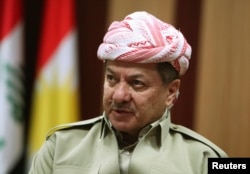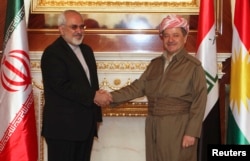Ankara's lack of support for Iraqi Kurds against the Islamic State militant group has cast a shadow over their otherwise close relationship.
In the past few years, Iraqi Kurdistan and Turkey have become close political and economic partners. But Ankara's failure to provide military support to Iraqi Kurds raises a question: is the relationship a casualty of the insurgency?
The possibility that Islamic State forces could overrun the semi-autonomous Iraqi Kurdistan region posed a key test of an alliance between Iraqi Kurds and its powerful neighbor. Political columnist Asli Aydintasbas of Turkish newspaper Milliyet has just returned from the Iraqi Kurdistan capital, Irbil, and says there is profound disappointment with Ankara.
"They are clearly disappointed with amount of help they are getting from Ankara. The truth is Irbil was about to fall — 22 kilometers — but also morale was really down," said Aydintasbas. "And when they reached out to Turkey, what they heard [was] largely 'we would love to come and help you in a stronger way, but we have 49 hostages.' This is not to say there is a crisis. They’ve made it very clear this is a strategic alliance that failed its first strategic test, so it’s not a strategic alliance."
Evolving relationship
Forty-nine Turkish diplomats and their families were seized by IS forces that overran the Iraqi city of Mosul. But columnist Aydintasbas claims some Iraqi Kurds are openly questioning whether Ankara is using the hostages as an excuse for inaction against IS. Observers say that frustration is, in part, due to the remarkable transformation in relations in the last few years, which has seen the Iraqi Kurdish leadership and Ankara turn rivalry and suspicion into a booming economic and political relationship.
That transformation is especially due to the efforts of Iraqi Kurdistan President Masoud Barzani.
According to Political scientist Nuray Mert of Istanbul University, the attack by Islamic State militants has damaged both the reputation of the Kurdish Regional Government (KRG) and President Barzani.
"This fight discredited KRG a lot, militarily and also politically," said Mert. "Especially Barzani's party's close alliance with Turkey — [it has] discredited Barzani. So this ISIL factor has had enormous impact on Turkish-Kurdish relations in general and Turkish-Barzani relations in particular. It means this advance of ISIL really shifted all balances and alliances in the region."
Before the ISIL offensive, Barzani had said Iraqi Kurds would hold a referendum on secession. However, the collapse of the Iraqi Kurdish forces and Turkey's perceived failure to intervene has observers discouraged about any hopes of independence in the near future.
Iran, which borders the Iraqi Kurdistan region, has quick to exploit any Iraqi Kurdish disappointment with Ankara, says Aydintasbas.
"Iran was there, out there offering help," said Aydintasbas. "'Whatever you guys need,' they were at the battlefield. And not just that. That Qasem Soleimani, head of Quds force, was out in the field fighting with the Kurds and being quite visible on the scene means something. This episode marks a comeback for Iran."
Strong economic ties remain between Iraqi Kurdistan and Turkey, which will mean it is likely both sides will maintain close political relations.
But analysts say Irbil is likely to look for more allies than be solely dependent on Ankara for support, a point Tehran and the new government in Baghdad will be stressing.
For Ankara, the same observers say that will be a blow, with the Iraqi Kurds the only entity it has close relations with in the region.






